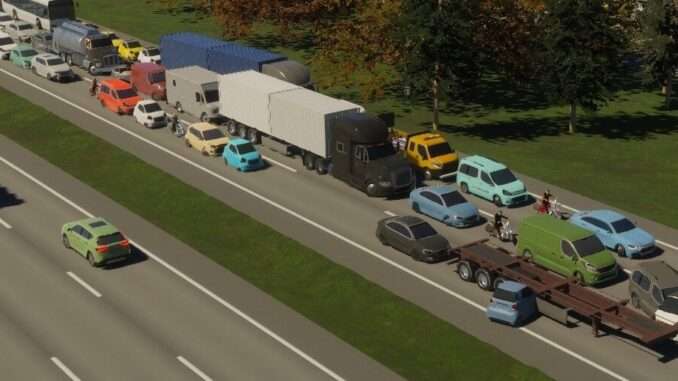
Roads
Roads are the main city infrastructure and the backbone of every city. They are the most most basic and important tool for building cities. There are several different types of roads available and they serve mainly two purposes: traffic and zoning.
At the start of a new city, only the two-lane road is available. More types of roads are unlocked after building the first road, and the rest are unlocked through milestones.
All road types aside from highways have a power line capacity of 40 MW (Low Voltage). Those that aren’t bridges also carry water and sewage pipes.
Certain road types are more suitable for residential zones and some for faster and heavier traffic. Some of the higher capacity roads such as highways do not even allow zoning next to them. Vehicles on larger roads also tend to generate more noise pollution and decrease the land value around them.
Driving Side
When creating a new city, the side of the road on which vehicles drive can be selected. Right-hand-drive is the default. The driving side cannot be changed later in the game.
Road Construction and Tools
The road tools
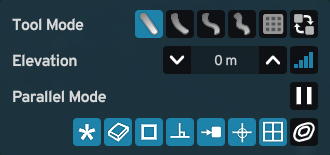
By default roads will snap to zoning cell length, 90° angles, the sides of a building, zone grid, guide lines and existing geometry. This behavior can be turned off in the construction menu.
Tool Mode
The Tool Mode determines the shape of the roads. There are six different options for drawing roads, which are listed below.
- Straight: First click determines the start point. Second click determines the end point.
- Simple Curve: First click determines the start point. Second click determines the bend. Third click determines the end point.
- Complex Curve: First click determines the start point. Second click determines the first bend. Third click determines the second bend. Fourth click determines the end point.
- Continuous: First click determines the start point. Second click determines the first bend. Third click determines the end point. Subsequent clicks create additional bends and end points.
- Grid: Create two initial points and then drag sideways to create a perfect grid.
- Replace: Hover over an existing road to replace a segment with a new road type. If the new road had a different width hovering over the left, right or center determines where the new road is placed.
Elevation
Elevation determines the elevation of the road compared to the start point and can be used to make roads go above and underneath each other without creating intersections.
Parallel Mode
Parallel Mode will create two roads perfectly side by side. The offset determined the distance in zone cells between the two roads and can be set from 0.25 to 12.
Directions
One-way roads allow traffic in one direction only and can decrease traffic congestion. The direction in which the road is drawn also determines the direction of the traffic. Traffic will move from the starting point to the end point of the road.
One way roads include most highways and highway ramps, so make sure to place highways in the right direction. Service vehicles cannot go against the flow of traffic and so even if a building next to a fire station is on fire if it is the wrong way down a one-way road the fire trucks will have to take the long route.
Commercial and industrial buildings also require goods to be delivered and picked up, if they are unable to be serviced often enough on a one way road they may stop operating effectively.
Two-way roads allow travel in both directions. These roads can increase traffic congestion but allow for less restricted pathing for cars through cities and so small two-way roads make for ideal low traffic roads.
Roundabouts
Intersections and road ends can be replaced by roundabouts. The number of lanes on the roundabout depends on the number of lanes in the roads connecting to it.
Vehicles entering the roundabout usually give way to those already on it but will cut in front of another vehicle already on it if a suitable opportunity arises. Roundabouts come in 4 sizes:
- Small roundabouts cost ₡ 200
- Medium roundabouts cost ₡ 500
- Large roundabouts cost ₡ 1000
- Very large roundabouts cost ₡ 1500
Road Types
Most roads come in different sizes and configurations. The larger the road, the higher the speed limit and traffic capacity.
Small Roads
Two-lane Road
Simple two-lane road that allows traffic in both directions.
Three-lane Asymmetric Road
Two lanes going one way and one in the other. Works well especially for turning lanes in an intersection.
One-lane One-way Road
Simple one-lane road that allows traffic in one direction.
Two-lane One-way Road
Simple two-lane road that allows traffic in one direction.
Three-lane One-way Road
Simple three-lane road that allows traffic in one direction.
Gravel Road
A narrow and slow speed unpaved road for vehicles, suitable for city outskirts and rural areas.
Alley
Narrow two-lane road without sidewalks. Allows traffic in both directions.
Pedestrian Street
A street where only foot traffic is allowed, apart from service and delivery vehicles.
Two-lane Wooden Covered Bridge
Wooden support structure with a roof on top of the bridge deck.
Two-lane Truss Arch Bridge
An arch under the bridge supports trusses, which in turn hold the bridge deck.
Medium Roads
Four-lane Road
Four-lane road that allows traffic in both directions.
Four-lane Divided Road
Four-lane road that allows traffic in both directions, with a divider in the middle.
Five-lane Asymmetric Road
Three lanes going one way and two in the other. Works well especially for turning lanes in an intersection.
Four-lane One-way Road
Four-lane road that allows traffic in one direction.
Five-lane One-way Road
Five-lane road that allows traffic in one direction.
Four-lane Tied Arch Bridge
An arch held in shape by tying chords sits above the bridge, and supporting hangers running down from the arch hold the bridge deck.
Grand Bridge
Highly decorated, large support towers with walkways between tie together heavy suspension cables that hold the bridge deck.
Large Roads
Six-lane Road
Six-lane road that allows traffic in both directions.
Six-lane Divided Road
Six-lane road that allows traffic in both directions, with a divider in the middle.
Seven-lane Asymmetric Road
Four lanes going one way and three in the other. Works well especially for turning lanes in an intersection.
Eight-lane Divided Road
Eight-lane road that allows traffic in both directions, with a divider in the middle.
Six-lane Oneway Road
Six-lane road that allows traffic in one direction.
Seven-lane Oneway Road
Seven-lane road that allows traffic in one direction.
Six-lane Divided Extradosed Bridge
Support cables run from short support towers to the bridge superstructure.
Eight-lane Divided Cable-stayed Bridge
Support cables run from upright towers in a fan-like pattern directly to the bridge deck.
Golden Gate Bridge
Originally located in San Francisco, this famous suspension bridge opened in 1937 and spans the strait that connects the San Francisco Bay to the Pacific Ocean.
Highways
Two-Lane Two-way Highway
Two-lane highway that allows traffic in both directions.
Three-Lane Two-way Highway
Three-lane highway that allows traffic in both directions.
Four-Lane Two-way Highway
Four-lane highway that allows traffic in both directions.
One-Lane One-Way Highway
One-lane highway that allows traffic in one direction.
Two-Lane One-Way Highway
Two-lane highway that allows traffic in one direction.
Three-Lane One-Way Highway
Three-lane highway that allows traffic in one direction.
Four-Lane One-Way Highway
Four-lane highway that allows traffic in one direction.
Five-Lane One-Way Highway
Five-lane highway that allows traffic in one direction.
Two-lane Highway Truss Arch Bridge
An arch under the bridge supports trusses, which in turn hold the bridge deck.
Two-lane Highway One-way Suspension Bridge
Suspension cables run between support towers, and vertical suspension cables hold the bridge deck.
Three-lane Highway One-way Suspension Bridge
Suspension cables run between support towers, and vertical suspension cables hold the bridge deck.
Four-lane Highway One-way Suspension Bridge
Suspension cables run between support towers, and vertical suspension cables hold the bridge deck.
Five-lane Highway One-way Suspension Bridge
Suspension cables run between support towers, and vertical suspension cables hold the bridge deck.
Parking Spaces
Parking spaces are an integral part of any city. Arranging facilities for residents and tourists traveling by car is an important factor in making the city a comfortable place.
When residents and tourists plan their way around the city, their decision-making is affected by the availability of parking in a manner similar to public transport options.
Road Services
Road Maintenance Depot
The Road Maintenance Depot, which sends out vehicles to keep roads in good condition, fighting wear and tear and decreasing the chances of traffic accidents.
During winter, snowplows are deployed to keep the roads clear of snow. The Roads infoview shows data about the condition of the roads, coloring them from green (good condition) to red (poor condition).
Poor road quality or excess snow slow down traffic and increase chance of traffic accidents occurring. Road Maintenance takes care of these traffic accident aftermaths, clearing out the debris and allowing traffic to continue safely after the police have secured the site of the accident.
Flow Control
Flow control elements are added with left-click and removed with right-click.
- Traffic lights and stop signs can be added and removed from intersections to control the flow of traffic.
- No turn left, no straight ahead and no turn right signs can be added and removed from road segments to prevent traffic from going in a certain direction at the end of the road segment.
- Crosswalks can be added and removed from road segments to allow pedestrians to cross the street at the end of the road segment.
- Wide sidewalks can be added and removed from the sides of road segments to create more space for pedestrians at the cost of removing roadside parking spaces.
- Trees and sound barriers can be added and removed from the sides of road segments to reduce the generated noise pollution. Trees can only be placed on roads and sound barriers can only be placed on highways.
- Lighting can be added and removed from highway segments to give them low voltage power transfer capacity.
Road Service Buildings
| Name | Size | Cost | Upkeep per Month | XP |
| Small Parking Lot A small parking area where citizens can park their cars. | 5×5 | ₡6.7K | ₡500 | 100 |
| Medium Parking Lot A medium sized parking area where citizens can park their cars. | 7×5 | ₡14.4K | ₡1.5K | 100 |
| Large Parking Lot A large lot for a great number of parked cars. | 10×8 | ₡94.95K | ₡5.0K | 150 |
| Very Large Parking Lot A huge parking lot that can handle a lot of parking. | 18×10 | ₡225.0K | ₡15.0K | 500 |
| Overground Parking Building A large parking garage with multiple floors. Can be upgraded with a car wash. | 12×14 | ₡225.0K | ₡10.0K | 500 |
| Underground Parking Building A parking garage where parking spaces are located underground. | 6×10 | ₡282.0K | ₡7.0K | 500 |
| Automated Parking Building A tower-shaped parking building with an automated elevator system for storing and retrieving vehicles. | 13×9 | ₡1.6M | ₡160.0K | 2000 |
| Road Maintenance Depot Base of operations for road maintenance personnel, their tools and vehicles. Road maintenance comprises road repairs, snow clearing, and traffic accident clean-up.Can be upgraded with an extra garage for a larger maintenance vehicle fleet. | 10×12 | ₡75.0K | ₡30.0K | 150 |
| Name | Noise pollution | Electricity consumption | Water consumption | Garbage accumulation | Workplaces | Max. needed education | Evening shifts | Night shifts |
| Automated Parking Building | 2500 | 700 | 20 | 25 | 12 | Poorly educated | 25% | 12.5% |
| Large Parking Lot | 5000 | 750 | 0 | 15 | 1 | Poorly educated | 25% | 12.5% |
| Medium Parking Lot | 2500 | 500 | 0 | 10 | 0 | Poorly educated | 25% | 12.5% |
| Overground Parking Building | 2500 | 700 | 500 | 50 | 4 | Poorly educated | 25% | 12.5% |
| Road Maintenance Depot | 5000 | 1000 | 60 | 100 | 10 | Poorly educated | 20% | 10% |
| Small Parking Lot | 2500 | 250 | 0 | 5 | 0 | Poorly educated | 25% | 12.5% |
| Underground Parking Building | 2500 | 700 | 500 | 50 | 2 | Poorly educated | 25% | 12.5% |
| Very Large Parking Lot | 5000 | 1000 | 0 | 20 | 4 | Poorly educated | 25% | 12.5% |
That’s it!


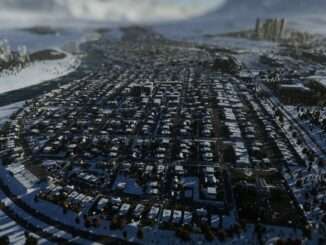
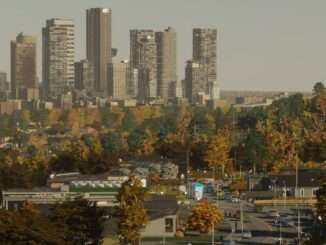
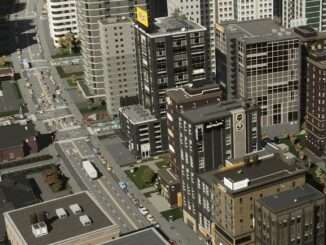
Be the first to comment